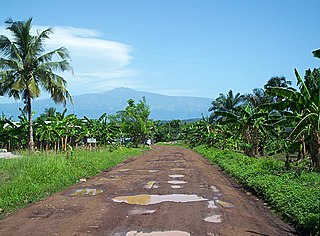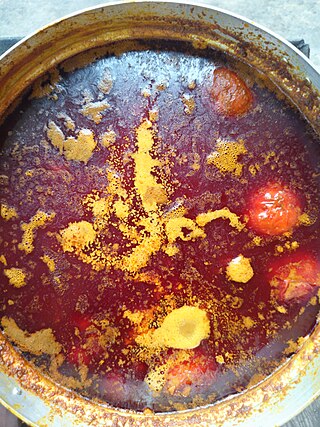See also
- All pages with titles containing Mbanga
- Mbangassina, a town and commune in Cameroon
- Mbangala language
Mbanga may refer to:
Banda may refer to:
Mono may refer to:
Faro may refer to:
Banga may refer to:
Kim or KIM may refer to:
Cameroonian may refer to:

Kumba is a metropolitan city in the Meme department, Southwest Region, Western Cameroon, commonly referred to as "K-town" colloquially. Kumba is the largest and most developed city in the Meme Department and is increasingly drawing in residents from the local villages such as Mbonge. It is also the largest urban area in the South-West. Kumba has an estimated population of about 400,000 with three quarters of this population being young due to advancement in medicine and lowering infant mortality. The N8 and N16 highways meet at Kumba.

Tiko, originally called ‘Keka’ by the Bakweris, is a town and important port in the southwest region of Cameroon. The settlement grew as a market town for Duala fishermen, Bakweri farmers and hunters from Molyko, Bwenga, Bulu and Bokova. The core quarters in Tiko include Streets 1 to 7, Motombolombo, Down Beach, New Quarter, P&T quarters, New Layout, Long Street, Likomba, Golf Club, Mutengene, Ombe. As of 2010, the town is estimated to have a population of 55,914.
Ndu may refer to:
Nkongsamba is a city in western Cameroon. It is in the Kupe-Manenguba department, which is in the Littoral region. As of the 2005 Census, the city had a population of 104,050. It is a centre for the farming of palm oil, bananas and coffee, and is between two mountains, the Manengouba Massif and Mount Nlonako. The central point is the "Ville"; other areas are measured in "Kilo", for kilometer. Mbo (Manenguba) is one of the languages used locally: in the surrounding district, Kaa and Baneka are used.

Cameroonian cuisine is one of the most varied in Africa due to Cameroon's location on the crossroads between the north, west, and center of the continent; the diversity in ethnicity with mixture ranging from Bantus, Semi-bantus and Shuwa Arabs, as well as the influence of German, French and English colonialization.
Bodo may refer to:
Mbanga is a town in western Cameroon.
Hina may refer to:

Bonaléa is a town and commune in Cameroon.

Grains of Selim are the seeds of a shrubby tree, Xylopia aethiopica, found in Africa. The seeds have a musky flavor and are used as a spice in a manner similar to black pepper, and as a flavouring agent that defines café Touba, the dominant style of coffee in Senegal. It is also known as Senegal pepper, Ethiopian pepper, and (historically) Moor pepper and Negro pepper. It also has many names in native languages of Africa, the most common of which is diarr in the Wolof language. It is called 'Etso' in the Ewe language of Ghana and Togo. It is sometimes referred to as African pepper or Guinea pepper, but these are ambiguous terms that may refer to Ashanti pepper and grains of paradise, among others.
Lambo Sandjo Pierre Roger, better known as Lapiro de Mbanga, was a Cameroonian singer who is noted for his 1985 recording of "Pas argent no love" and for being imprisoned in 2008 after criticising Cameroon president Paul Biya in the song "Constitution constipée".
Peter Wuteh Vakunta is an author, literary theorist, poet, and professor, noted for his work in and on hybrid languages, including Camfranglais, Cameroonian Creole, linguistic indigenization, and multilingual educational systems. He is originally from Bamunka-Ndop, in the Northwest Region of the Republic of Cameroon, and currently teaches French language and literature and serves as Chair of the Department of Modern Languages at the University of Indianapolis.

Palm nut soup or banga is a soup made from palm fruit and it is common in the Ghanaian, Nigerian and Ivorian communities. The soup is made from a palm cream or palm nut base. The palm cream is combined with flavorful marinated meats, smoked dried fish, and aromatics to create a rich, deeply flavored soup that can be eaten with starch, fufu, omotuo, banku, fonio, or rice. Palm oil is very significant to Nigerian, Ghanaian and other West African cuisine.
Oku or OKU may refer to: